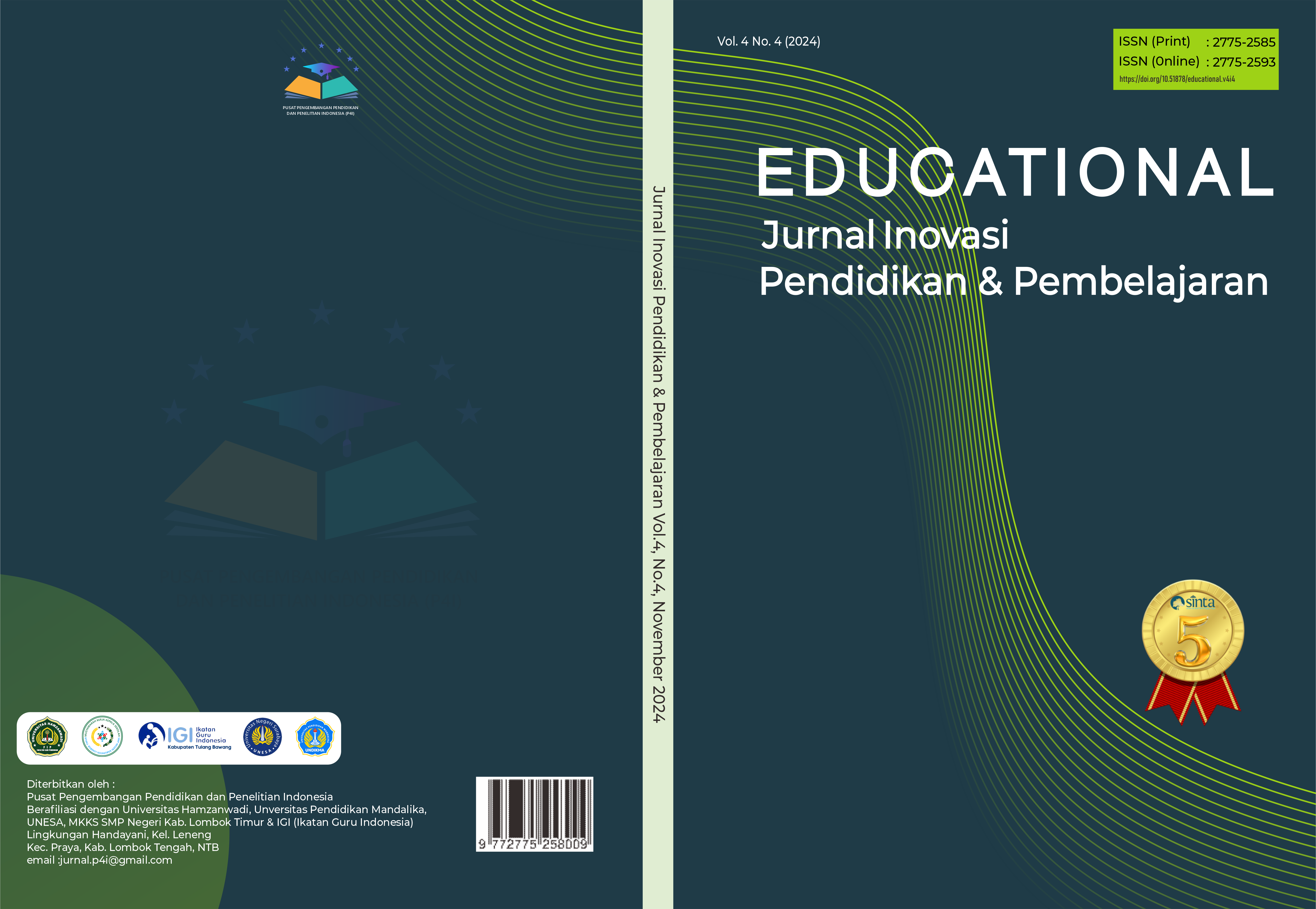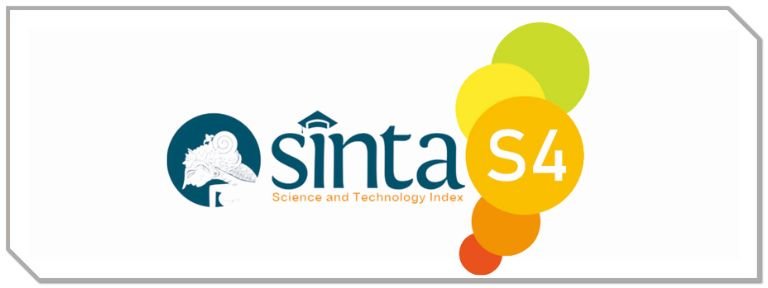THE DESCRIPTIVE ANALYSIS OF STUDENTS’ READING COMPREHENSION LEVEL IN PPA IO-0130 OMASIO IN TOURISM TEXT
DOI:
https://doi.org/10.51878/educational.v4i4.3478Keywords:
Penelitian kualitatif, Analisis Deskriptif, Tingkat Pemahaman Membaca Siswa, Teks PariwisataAbstract
This study focuses on a descriptive analysis of the level of reading comprehension of PPA IO-0130 Omasio students in understanding tourism texts. This study aims to explore students' abilities in understanding various aspects of tourism texts, including literal, inferential, and critical comprehension. A qualitative descriptive approach was used to collect and analyze data from essay tests and interviews involving 16 student respondents. The findings of the study revealed that the majority of students (87.5%) showed a very good level of literal comprehension, where they were able to identify and recall factual information stated explicitly in the text. In addition, 93.75% of students showed a very good level of inferential comprehension, reflecting their ability to infer and understand implicit meanings in the text. At the critical comprehension level, 93.75% of students achieved a very good score, indicating their ability to evaluate and analyze information in depth, including distinguishing between true and false information and identifying moral messages implied in the text. This study also identified several factors that affect students' reading comprehension, including limited vocabulary, inadequate mastery of grammar, and low reading interest. Many students report difficulty understanding the complex sentence structures and unfamiliar vocabulary often found in formal tourism texts. Lack of interest in reading further exacerbates these challenges, especially when students are not exposed to texts that are relevant or interesting to their daily lives or academic interests.
ABSTRAK
Penelitian ini berfokus pada analisis deskriptif tingkat pemahaman membaca siswa PPA IO-0130 Omasio dalam memahami teks pariwisata. Penelitian ini bertujuan untuk mengeksplorasi kemampuan siswa dalam memahami berbagai aspek teks pariwisata, termasuk pemahaman literal, inferensial, dan kritis. Pendekatan deskriptif kualitatif digunakan untuk mengumpulkan dan menganalisis data dari tes esai dan wawancara yang melibatkan 16 responden siswa. Temuan penelitian mengungkapkan bahwa mayoritas siswa (87,5%) menunjukkan tingkat pemahaman literal yang sangat baik, di mana mereka dapat mengidentifikasi dan mengingat informasi faktual yang dinyatakan secara eksplisit dalam teks. Selain itu, 93,75% siswa menunjukkan tingkat pemahaman inferensial yang sangat baik, mencerminkan kemampuan mereka untuk menyimpulkan dan memahami makna implisit dalam teks. Pada tingkat pemahaman kritis, 93,75% siswa mencapai skor sangat baik, menunjukkan kemampuan mereka untuk mengevaluasi dan menganalisis informasi secara mendalam, termasuk membedakan antara informasi benar dan salah serta mengidentifikasi pesan moral yang tersirat dalam teks. Penelitian ini juga mengidentifikasi beberapa faktor yang mempengaruhi pemahaman membaca siswa, termasuk keterbatasan kosakata, penguasaan tata bahasa yang kurang memadai, dan minat baca yang rendah. Banyak siswa melaporkan kesulitan dalam memahami struktur kalimat yang kompleks dan kosakata yang tidak familiar yang sering ditemukan dalam teks pariwisata formal. Kurangnya minat baca lebih lanjut memperburuk tantangan-tantangan ini, terutama ketika siswa tidak terpapar pada teks yang relevan atau menarik bagi kehidupan sehari-hari atau minat akademis mereka.
Downloads
References
Al Otaiba, S., Allor, J., & Baker, K. (2020). Reading comprehension: From research to practice. Perspectives on Language and Literacy, 46(3), 27-31.
Brock, J. (2017). Descriptive Analysis: Examining Phenomena in Education. Educational Research Journal, 32(2), 18-25.
Cakir, I., & Mutlu, A. (2021). Exploring the Tourism Vocabulary Knowledge of EFL Students. Journal of Tourism Education, 34(2), 45-61.
Caroline, R., et al. (2022). Interviewing in Qualitative Research: Best Practices for Data Collection. Social Sciences Methodology, 18(3), 94-101.
Dewi, R. (2022). Qualitative Data Analysis Techniques. Methods in Educational Research, 15(4), 78-89.
Grabe, W., & Stoller, F. (2020). Reading in a Second Language: Moving from Theory to Practice. Cambridge University Press, 2nd Edition.
Harmer, J., & Rauf, A. (2012). The Role of Rubrics in Assessing Reading Comprehension. Journal of Education, 29(1), 32-45.
Hossein, M. (2015). Descriptive Research in Social Science. Qualitative Methodology Journal, 27(1), 123-132.
Herlina, D. (2022). Structuring Tourism Texts for Educational Purposes. Journal of Applied Linguistics and Tourism, 18(3), 75-87.
Kendeou, P., & Van den Broek, P. (2020). The Cognitive Processes Underlying Reading Comprehension: A Framework for Intervention. Educational Psychologist, 55(2), 85-102.
Khoshsima, H., & Shokri, M. (2019). The Impact of Cultural Background Knowledge on EFL Learners’ Reading Comprehension of Tourism Texts. Journal of Educational Research, 42(3), 103-117.
Khoirunnisa, A., & Suhartono, B. (2022). The Use of Tourism Texts in Teaching Reading. Language Education Review, 11(2), 89-97.
Khoirunnisa, A., & Suhartono, L. (2022). Utilizing tourism texts in reading comprehension class: Students' perspectives. EduLite: Journal of English Education, Literature and Culture, 7(1), 122-134.
Lew, A. A., Cheer, J. M., Haywood, M., Brouder, P., & Salazar, N. B. (2020). Vitalizing the UNESCO Trails movement: The emerging cultural routes of Bali. Journal of Tourism and Cultural Change, 18(2), 144-157.
Malandita, T. (2019). The Cognitive Processes in Reading. Psychology of Learning, 23(5), 72-84.
McNamara, D. S., Graesser, A. C., & Louwerse, M. M. (2020). Reading Comprehension Strategies: Theories, Interventions, and Technologies. Annual Review of Psychology, 71, 271-303.
Mehrgan, K., & Mehrabi, M. (2022). EFL Learners’ Reading Comprehension of Tourism Texts. International Journal of Tourism Studies, 19(4), 88-102.
Moscardo, G., et al. (2021). Tourism Texts and Their Role in Cultural Exchange. Journal of Tourism Communication, 21(1), 45-57.
Mulyati, S., et al. (2020). Reading strategies for improving reading comprehension. English Language Teaching and Research Journal, 4(2), 92-105.
Nugraha, I. S., Fitriati, S. W., & Wulandari, M. (2021). An analysis of student's ability in writing tourism text of the tenth graders in the academic year 2020/2021. PROJECT (Professional Journal of English Education), 4(2), 256-263.
Nuttal, C. (2020). The Reader and the Text: Cognitive Approaches to Reading Comprehension. Applied Linguistics Journal, 30(4), 56-73.
Paris, S. G., Hamilton, E. E., & Spires, H. A. (2021). Understanding Reading Comprehension: Processes and Practices. Journal of Literacy Research, 53(2), 128-145.
Purwanto, N. (2014). Assessment in Education: Scoring and Evaluation Methods. Educational Studies Journal, 19(3), 103-116.
Rahmawati, I. D., & Fahriany, F. (2020). The effect of prior knowledge on reading comprehension. English Education Journal, 10(3), 382-391.
Routledge. Referensi: Tracey, D. H., & Morrow, L. M. (2023). Lenses on reading: An introduction to theories and models. Guilford Press.
Shekary, N., et al. (2023). The Importance of Reading Tourism Texts in EFL Learning. Tourism and Language Journal, 22(1), 37-51.
Shanahan, T., Fisher, D., & Frey, N. (2020). The Challenge of Challenging Text. The Reading Teacher, 74(1), 25-32.
Suryani, N., et al. (2022). The influence of interest on reading comprehension achievement. Jurnal Pendidikan Bahasa Inggris, 8(2), 115-128.
Sutari, D. (2019). Reading in a Second Language: Cognitive Processes and Challenges. International Linguistics Journal, 22(2), 101-114.
Syafitri, W., & Amir, P. (2022). Environmental factors affecting reading comprehension ability. IJOLER: International Journal of Language Education and Research, 2(1), 55-68.
Tamba, R. P., et al. (2021). The contribution of vocabulary mastery on students' reading comprehension. Journal of English Education and Teaching, 5(1), 104-112.
Tracey, D., & Morrow, L. (2023). Constructing Meaning from Text: A Cognitive Approach. Educational Psychology, 34(2), 9-21.
Woolley, G. (2020). Reading comprehension: Teaching for understanding. Oxford University Press.
Yulianti, S., & Yunus, M. M. (2020). Utilizing tourism texts in reading comprehension instruction: Exploring students' critical thinking skills. International Journal of Instruction, 13(4), 827-842
Zikmund, W. G., Babin, B. J., Carr, J. C., & Griffin, M. (2020). Business research methods. Nelson Education.
Zouganeli, E., Kafrouni, R., & Papadima-Sophocleous, S. (2021). Tourism discourse in EFL textbooks: A critical discourse analysis. Journal of English for Academic Purposes, 49, 100945.
Downloads
Published
How to Cite
Issue
Section
License
Copyright (c) 2024 EDUCATIONAL : Jurnal Inovasi Pendidikan & Pengajaran

This work is licensed under a Creative Commons Attribution-ShareAlike 4.0 International License.
















